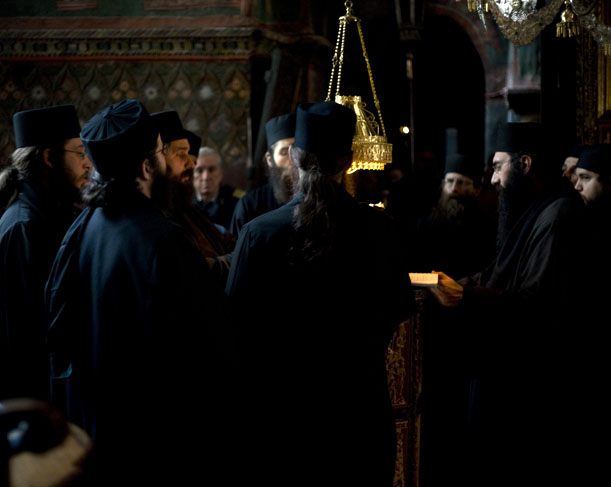How to Worship (Fr. Dimitri Cozby)
4 Σεπτεμβρίου 2016
Every priest is asked questions about behavior during worship, both what should be done to show proper respect in the Lord’s temple and what can be done to achieve more meaningful participation in the services. This article will attempt to address some of the more common questions and concerns; it draws on a variety of sources. These should not be taken as laws to be obeyed, but as aids to an attitude or frame of mind which will make our parish’s worship more meaningful to each of us.

Whenever we enter or leave the temple we should do so as quietly as possible, so as not to disturb the prayers of our brothers and sisters.
As we enter or leave the temple, we should first face the altar and cross ourselves. Before going to our place, we should venerate the icon of the Patron Saint or of current Feast in the center of the temple and the icons of our Lord and the Theotokos (after buying and lighting candles, if we so desire).
It is best to avoid traffic in and out of the church during services. Especially do not enter or leave during a censing, an entrance, the Scripture readings, or the sermon; coming and going is especially distracting at these times. Being late for services is a common failing among Orthodox of all sorts, but it is not something we should be proud of. Leaving services early without a very good reason is just as bad.
While in the temple we should try to maintain an attitude of prayer and a spirit of humility, like the tax collector of the Gospels (Luke 18:10-14). Our purpose for coming is to approach our Lord and King in company with our brothers and sisters; we come together to constitute God¹s Church. These facts should govern our attitudes and behavior.
We should avoid conversation in the church even if the service has not yet begun. We should spend the time before services preparing for worship; necessary conversation should be conducted quietly so as not to disturb the meditations of others.
We will get more out of the services if we pray rather than merely attend them. Allow the hymns to enter your heart, and make their words your own. Remember that the services are not a time for private prayers but for sharing in the common worship of the Church.
Follow the service with your body as well as your mind. Orthodox piety is rich in actions which enable the whole person to worship. We should cross ourselves at the proper times (on hearing an invocation of the Trinity, and at any prayer or petition which personally affects you). At censings and blessings the proper response is to bow to the priest (crossing oneself is not necessary). During Great Lent there are times when we kneel or do prostrations; follow the priest and altar servers in this matter. Kneeling is not proper on Sundays, since each Sunday is a feast of the Resurrection, a weekly Pascha. (The reader or choir is exempted from certain actions if performing them disrupts the service.)
Let us remember above all that the temple must be filled with an attitude of mutual love and respect. We have assembled to share in the Church’s worship, to unite with each other and our Lord, to anticipate the joyful time when we are gathered into His Kingdom. Our attitude toward one another should reflect that of the Lord, who loves us all and desires nothing more than our spiritual growth and our salvation.
Courtesy of orthodoxinfo.com





